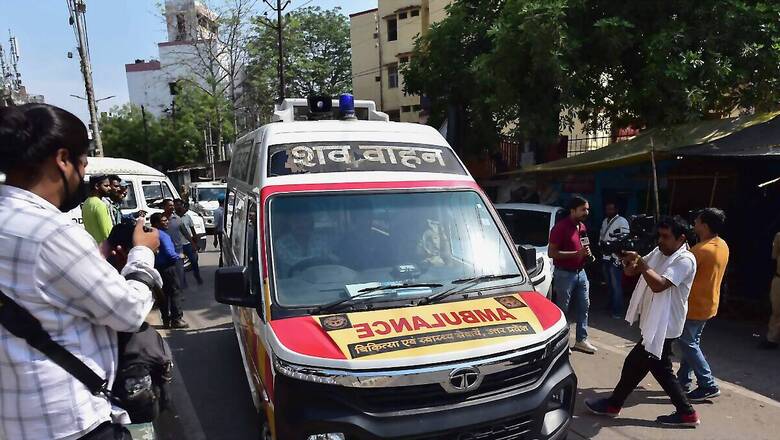
views
The murder of gangster-turned-politician Atiq Ahmed and his brother by assailants while in police custody, and the ‘encounter’ deaths of Atiq’s son Asad and an accomplice have generated a lot of heat and debate in India on custodial deaths and extra-judicial killings.
Let’s be clear. Deaths during incarceration, detention, police custody or via so-called ‘encounters’ are symptoms of systemic incompetence, perverse machismo, weak institutional structures and are patently illegal. These have no place in civil society.
Extrajudicial violence does away with separation of powers in a democracy and is a threat to the rule of law. And yet this meting out of ‘instant justice’ by law enforcement bypassing the legal-judicial system, where the mafiosi and their henchmen are seen finally getting their ‘just desserts’, runs on a motivation driven by wide public approval and even tacit political encouragement.
This piece primarily tries to understand why it is so, and whether Uttar Pradesh, as is being said, has suddenly turned into a ‘free-for-all jungle raj where rule of the gun has replaced rule of the law’ and “vultures”, as Asaduddin Owaisi has put it, are rejoicing at the turn of events.
Mobster-politician Atiq, serving a life sentence, and his brother Ashraf were shot multiple times Saturday by three gunmen posing as journalists from point blank while being taken for a routine check-up at a medical facility in Prayagraj. The assailants were nabbed. Atiq, a dreaded don-cum-history sheeter-turned politician, was an accused in the Umesh Pal murder case. That was just one among hundreds of other cases. The murders were caught live on TV.
Two days earlier, Atiq’s 19-year-old son Asad and an aide Ghulam, prime suspects in the Umesh Pal murder case and both with a Rs 5 lakh bounty on their heads, were killed in an alleged encounter by Uttar Pradesh police’s special unit near Jhansi. The accused, trying to give cops the slip in a bike, had on February 24 murdered Umesh Pal, a key witness in the murder of BSP leader Raju Pal.
UP chief minister Yogi Adityanath had applauded the UP STF (special task force) for the ‘encounter killings’ of Asad and his accomplice despite criticism from the Opposition but has appeared ill at ease at the brazen way Atiq and his brother were killed before media personnel while being escorted by the police.
The chief minister has ordered the formation of a three-member judicial committee to investigate the murders, and a three-member special team to probe the circumstances behind the murder. Seventeen cops have reportedly been suspended.
It would be analytically wrong, however, to deduce that these incidents indicate a “complete breakdown of the law-and-order machinery” of one particular state. UP is neither the first state where extrajudicial killings have occurred, nor is this the first instance when Indian public have greeted the brazen murders of notorious criminals and their associates with schadenfreudian jubilation.
The malaise runs deeper in India’s body politic and requires greater understanding of the circumstances in which these killings take place and the acceptance that they find in society than a partisan game of accusations and counter-accusations.
Union home ministry data says between January 1, 2017, and January 31, 2022, there were a total of 655 police encounters. Chhattisgarh had the highest number (191), followed by Uttar Pradesh (117), Assam (50), Jharkhand (49), Odisha (36), Jammu and Kashmir (35) and Maharashtra (26). The malaise cuts across political divides.
Let’s take another data point. Through an RTI application filed in 2018, Firstpost found that 1,782 cases of ‘fake encounters’ were registered in India between 2000 and 2017. It was also found that the greatest number of cases registered since 2000 was in the year 2012 when 226 fake encounter incidents were reported. The National Human Rights Commission recorded 725 cases between 2010 and 2017. Evidently it is pointless to trace the reasons behind a systemic dysfunction to a state, political party or a regime. We must look for answers elsewhere.
Mafia dons in India, protected by political power, know how to game the law-enforcement and judicial systems. They can evade law enforcement or come out of jail at the snap of a finger. ‘Lying low’ after committing a crime, carrying out felonious activities or extending criminal network despite being in prison, ‘bumping off’ people, indulging in kidnapping, rape, extortion, and then walking into the political arena and becoming an MLA or an MP and commanding the entire might of the Indian state has become institutionalized to the point of normalization. This creates a sense of deep injustice.
People know that today’s mobsters who enjoy political patronage may become tomorrow’s leaders, and therefore have learnt to accept and comply with the crime-politics nexus and its myriad repercussions. No one wants to get shot, robbed, raped or kidnapped. The state offers little protection. The ‘rule of law’ does not exist for the delinquent.
This creates a trust deficit. Ordinary people know that crime pays in India. From films such as Don, Gangs of Wasseypur, Gangajal, Omkara, Maqbool and Mirzapur, our popular culture has created tons of content through decades that reflects this endemic dysfunction and the resultant frustration. In this paradigm of trust deficit in government and plebian helplessness, popular support grows for extrajudicial killings.
Atiq is a case in point. First accused of murder in 1979 when he was all of 17 years old, the dreaded don had more 250 cases of kidnapping, extortion, ransom and murder lodged against him, but it wasn’t until 2007 that he was convicted of kidnapping Umesh Pal, as Shekhar Gupta writes in The Print. In between, he turned from a street ruffian to a copybook mafia leader, the most fearsome ‘bahubaali’ in the badlands of India’s largest state. He crossed over into politics and changed parties at will, eventually rising from MLA to an MP.
Little wonder that the killing of the mobster, his son, his associates and the collapse of his Rs 1400 crore empire built over the blood and extortion of innocents have been met with almost a sense of relief.
Shanti Devi, the mother of Umesh Pal — key witness in the Raju Pal murder case who was mowed down in broad daylight by Asad and his gang, possibly on the orders of Atiq — has “thanked” the UP chief minister for giving “justice” after Atiq’s son was killed in a police ‘encounter’.
Khusnuda, mother of Ghulam Mohammad, the aide of Asad who was also killed in the encounter, has said the Yogi government has taken “absolutely correct action”, “all gangsters and criminals will take a lesson from this” and has refused to accept her son’s mortal remains.
What we see here is explicit approval for extrajudicial killings from members of the public who have lost all faith in the criminal justice system. This is a result of the abject failure of one of the most important institutions of state, the judiciary, that keeps mountains of cases pending and it often takes years, even decades to turn the wheels of justice, if at all. It is also an indictment of the criminal justice system that often fails to bring criminals to book.
In 2019, four men accused in the murder and gang-rape of a 26-year-old woman, a Hyderabad veterinarian, were killed in a ‘police encounter’. The four had allegedly abducted, gang-raped and murdered the woman before charring her body and dumping the remains at an underpass near Hyderabad.
According to the police, while the accused were taken to the scene of crime for ‘reconstruction’, they tried to snatch the weapons and had to be killed. A Supreme Court-appointed commission had later called the encounter “fake”.
The case, however, had created such a public outrage that widespread jubilation broke out in Hyderabad and the cops who carried out the encounter were lauded and celebrated as “heroes”. Sweets were distributed, firecrackers went off and cops were showered with flower petals.
A report in The Hindu from that time notes, “The public jubilation was so much that the police had to take Mr. Sajjanar (Cyberabad Commissioner of Police) through another route, fearing that the crowd might stop his vehicle to felicitate him. They also bathed his pictures with milk and honey.”
A survey in 2018 by advocacy group Common Cause and the Centre for Study of Developing Societies (CSDS), involving over 15,000 people across 22 Indian states and UTs on ‘The Status of Policing in India Report’ revealed that one out of two people condoned the use of violence by the police.
It is in this paradigm that extrajudicial killings take place. When cases involving rape, gang-rape and murder have a pendency of 48.8% with the police, and a staggering 96.9% with the courts (NCRB data for 2020 via Prakash Singh, Outlook), people’s frustration with the governance machinery and police’s resorting to shortcuts to stave off public pressure is inevitable.
The issue, ultimately, lies with severe lack in the capacity of Indian state that is still quite poor and resource-starved, and its jittery, halting, even messy progress from a semi-feudal society under the framework of a Parliamentary democracy. The endemic institutional weaknesses cannot be wished away, nor can the problem be fixed in a jiffy.
In his book When Crime Pays, Money and Muscle in Indian Politics (2017, Harper Collins), American political scientist Milan Vaishnav writes, “Unlike many countries in the West, India embarked on its democratic journey without first possessing capable institutions of governance. Whereas many advanced industrialized democracies built strong states over centuries before embarking on a process of political liberalisation, India instituted universal franchise from the outset, operating under the constraints of a relatively weak institutional framework.”
Howls of theatrical outrage, political bickering and partisan virtue-signalling over extrajudicial killings are good for primetime TV debates and Twitter tantrums but useful for little else. The key is to address endemic capacity constraints and strengthen India’s institutional frameworks. Public support for extrajudicial killings will erode when right conditions are created, and when that happens, police and politicians will be less inclined to take shortcuts.
The author is Deputy Executive Editor, Firstpost. He tweets at @sreemoytalukdar.
Read all the Latest Opinions here


















Comments
0 comment